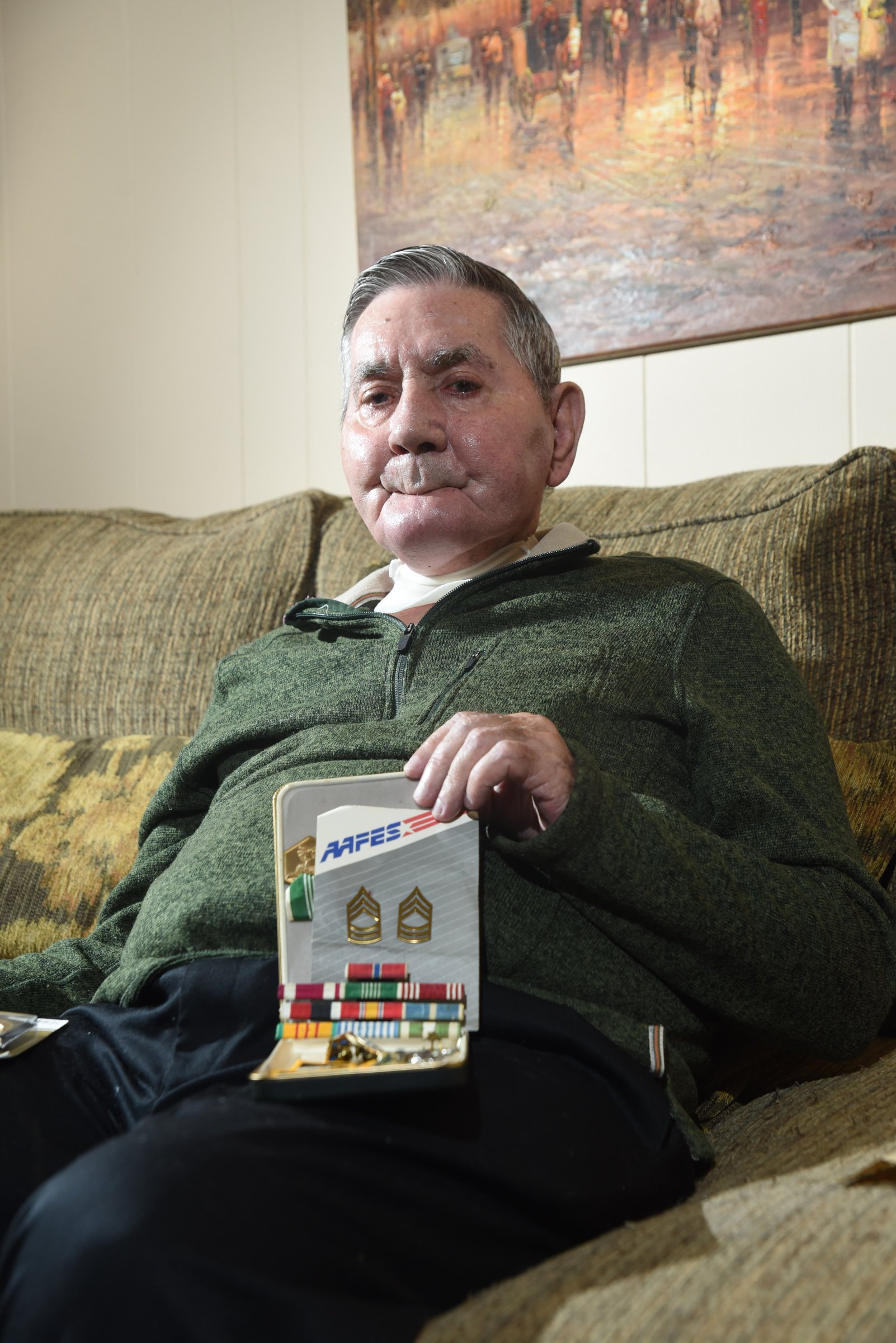Master Sgt. Irvin Boatwright's right hand shook violently last month as he ran a black marker across a small whiteboard on his lap. In his sister's Rossville, Georgia, home, he tried to share the highlights of his 26-year military career, the key dates and locations and missions.
Writing is his main mode of communication these days. After finding cancer in his esophagus, a doctor removed Boatwright's larynx in 2001. He then relied on an artificial voice box, using the robotic speech you hear in anti-smoking ads. But in 2015, his cancer returned. A doctor removed his tongue.
His hand betrays him now, too. A doctor hasn't been able to explain the cause to his family, but Boatwright is racked with tremors. As he tries to write, he repeatedly slaps the tip of the marker against the board. TapTapTapTapTapTapTap. His sister and niece try to make out the words. They can't make out the words.
But after about 30 minutes one morning, Boatwright became stable for a moment. His sister, Estelle, mentioned his time in Germany, where he and other members of the U.S. Army worked at Spandau Prison. Boatwright guarded somebody important, she said. But who was it?
"RUDOLF HESS," Boatwright wrote, cleanly.
Hess was Adolf Hitler's deputy and chosen successor. He was taken prisoner in 1941 while trying to broker peace with the British and remained under military watch for the rest of his life. Estelle asked Boatwright, 82, what Hess was like.
"HE," Boatwright wrote.
"WAS"
"A"
"REAL"
"SOB"
BIO
Name: Irvin BoatwrightAge: 82Branch of the military: U.S. Air Force/U.S. ArmyYears of service: 1951-1977
Raised in Rossville among eight siblings, Boatwright first enlisted at the age of 13. He went to a recruiter's office and handed in some paperwork for the Army National Guard, said his son, Walter Boatwright. It's not clear now how old he had claimed to be at the time. But his older sister, Wilma, signed the paperwork as if she were his guardian.
Boatwright was raised in the World War II era and idolized military life. He dreamed of seeing the world. Soon after he signed up for service, the Korean War began, and the National Guard announced it would send his unit overseas. Boatwright said he was ready. But Wilma told her parents what happened, and they then explained to the recruiter's office exactly how young their new member was.
He managed to join the U.S. Air Force a couple of years later, at the end of the war. He stayed four years but was not happy in that branch. His superiors assigned him to supply and records, and Walter Boatwright said his father spent most of his time guarding tankers at a base in Georgia.
Boatwright then enlisted in the U.S. Army and served two years in Vietnam as part of the 173rd Airborne Brigade Combat Team. He returned home and considered civilian life. But both of his sons were born with spina bifida. Boatwright knew medical treatment would be expensive, and the military provided for families better than most jobs. He then shipped off to Fort Bragg in North Carolina and trained to become a Green Beret.
John Woodham, who was stationed at Fort Bragg at the same time, said Boatwright oversaw his unit, making sure they kept their dorms proper and followed the Army's rules.
"He was a very professional man," Woodham said. "A very good role model for us young soldiers."
 View our 21 Veteran Salute page
View our 21 Veteran Salute pageBoatwright returned to Vietnam for another two years and performed reconnaissance work. Though much of his service was classified at the time, his son said, Boatwright worked in Laos and Cambodia. He was exposed then to Agent Orange, his son said.
After retiring, Boatwright taught ROTC programs at Central High School, Ringgold High School and Lakeview-Fort Oglethorpe Hospital. In 1985, when he came to Ringgold, he worked alongside Woodham. They hadn't seen each other in 17 years but quickly became friends again. Woodham said Boatwright brought a vast knowledge of military leadership and intelligence gathering to the schools.
In the 1990s, Boatwright's voice faded. It became weaker over several months. He insisted that he must have the flu, but Walter Boatwright begged him to go to a hospital. Finally, when he did, a doctor found cancer in his throat. He concluded the disease was the result of exposure to Agent Orange.
Walter Boatwright told his dad he could retire from his ROTC teaching, live out the rest of his days without the pressures of work. Instead, he returned to school with a voice amplifier. His son said he found small joys in sharing his experience with students.
That, too, is gone now. But he said his father still enjoys his time with his family, as well as the fellow servicemen who pay him visits. He isn't interested in packing it in.
"They teach you that," Walter Boatwright said. "Never die. Never give up. Push past pain. You keep going."
Contact staff writer Tyler Jett at 423-757-6476 or tjett@timesfreepress.com. Follow him on Twitter @LetsJett.

